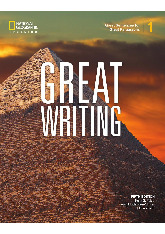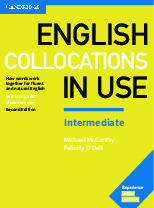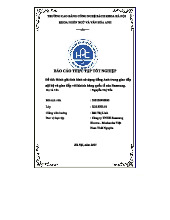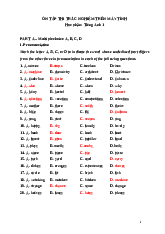









Preview text:
lOMoAR cPSD| 45254322
SESSION 2: FAMILY – READING & WRITING I. READING
1. The photos show three different types of family. Match the photos with the words. single-parent family ________
extended family ________ nuclear family ________
2. Complete the three descriptions with a family page from Exercise 1. A Greg
Our family is a typical __________. There's me, my wife, Sue, and our three children, Adam,
Tessa and Tony. We're from Scotland but we live in London - we moved here for work. One of the
disadvantages is that the boys don't see much of their grandparents or their cousins, except for
when we go to Scotland during the school holidays. B Benjy
It isn't easy being a __________. I got divorced five years ago and now it's just me and the kids.
My ex-wife got a new job and moved to Australia. She stays in touch with the children and sends
money, but she isn't here to help me bring them up, and my parents live abroad so they can't help. C Beatriz
We have a big house in the south of the country. It's divided into three apartments: one for my
parents, one for my brother and his wife, and one for me, my husband, and our two children.
Living in an ___________ is very convenient. My brother and his wife are often away but there's
always someone to talk to and discuss problems with, or to help with childcare and we save
money by sharing things and helping each other.
3. Match the words 2-12 with the definitions a-l. lOMoAR cPSD| 45254322
1. husband a. two people who are married or in a romantic relationship 2. wife
b. a woman who married one’s father after the death of one’s 3. sibling
mother or after one’s parents divorce 4. stepmother
c. a marriage arranged by the parents of the bride and groom 5. divorcee d. a relative by marriage 6. in-law e. a person who is divorced 7. household
f. the male partner in a marriage 8. couple
g. a woman whose husband has died/ a man whose wife has died 9. arranged marriage
h. all the people of approximately the same age, regarded as a 10. wedding group 11. widow (f) / widower (m)
i. a religious or legal ceremony where two people get married 12. generation
j. the female partner in a marriage
k. the people who live together in a house
l. a person’s brother or sister
4. Decide if the words refer to females, males or either. brother divorcee husband mother-in-law parent sibling son-in-law stepchild widow wife Female Male Either brother
5. Choose the correct words to complete the sentences.
1. Our neighbor, Mr. James, is a husband / divorcee / widower. His wife died three months ago.
2. I married my husband / sibling / son in 2013.
3. Mahiro and James are the young widows / generations / couple who live in the apartment downstairs.
4. There are four people in the couple / marriage / household: Mr. and Mrs. Jones and their two children, Alan and Jenny.
5. Mo and Raziel had a tidy / an ordered/ an arranged marriage.
6. 'How many stepchildren / siblings / parents have you got?' 'I've got two older sisters and a younger brother.'
7. 'Do you get on with your step-parents / parents / parents-in-law?' 'Yes, my wife's mum and dad are really nice.'
8. Stephan and Ana are my in-laws / stepchildren / siblings. They're my wife's children from her first marriage.
6. Read three statements about families and the questions that follow. Can you answer the questions
using only the information in the statements? Put a tick if you can, or write NOT GIVEN if not. lOMoAR cPSD| 45254322 Statements Questions Tick or NOT GIVEN
a. Nuclear families, with mother,
1. Can you have a nuclear family of three
father and child/children, are people? more common in large cities.
2. Were there any nuclear families 500 years ago?
b. In China, there are words for
3. What is the reason for China having so many many kinds of family
words for family relationships?
relationships, e.g. a word for
4. Does ‘aunt’s grandson’ have exactly the same
‘ father’s sister’s son’s daughter’s meaning as the example? son’.
c. One of the main reasons for
5. How does an arranged marriage keep the arranged marriages is to keep
family money and property safe? money and property in the
6. Are there other reasons for arranges family.
marriages other than keeping wealth in the family?
7.Read three more statements about families. Write TRUE if the text next to it confirms the information,
FALSE if it contradicts the information, or NOT GIVEN if there is not enough information. Statements information Tick or NOT GIVEN Children in large families
1. Children with lots of brothers and sisters usually have usually don't have many more things of their own. possessions, but one
2. Brothers and sisters can provide help for each other.
advantage is that they can get 3. Large families share their possessions. help from their brothers and sisters. People sometimes talk about
4. People think there are many disadvantages of living the disadvantages of being a in a single-parent family.
child in a single-parent family, 5. Children with one parent are looked after better. but single parents are often
6. A single-parent family can have benefits for the closer to their children.
children as well as disadvantages. In families around the world,
7. In Britain, the father is usually the head of the family.
the father is usually in charge; however, it is usually the
8. In many countries, although the father is important, mother who takes charge of
the mother deals with the home. the home.
9. Mothers are the head of the family in most countries around the world. lOMoAR cPSD| 45254322 PRACTICE
Questions 1-8. Do the following statements agree with the information in the text? Write: TRUE
if the text confirms the statement FALSE
if the text contradicts the statement
NOT GIVEN if it is impossible to know from the text Statements
1. Sixty years ago, children were expected to help around the house. ________
2. Today the world is a more dangerous place. ________
3. Helicopter parents love their children more than other parents ________
4. People today have shorter childhoods than children in the past. ________
5. In the past children who lived in the country worked out of doors. ________
6. Eighteenth-century mothers were cruel or indifferent to their children. ________
7. Children serving in the Royal Navy in the eighteenth century might find themselves in charge of adults. ________
8. Modern Western ideas about childhood are probably considered unusual in other cultures. ________ The Meaning of Childhood
What do we mean by a 'normal' childhood? It really depends on the period when a person was born and
where they live. If you asked a parent in Britain today, they would probably say that childhood should be
the happiest time of a person's life: a time when the child is loved, kept safe and is free to play.
However, even within the same culture, ideas about childhood have changed dramatically within a short
period of time. British children growing up in the 1960s or 1970s seem to have had more freedom than
children in the early twenty-first century. They were allowed to go about more freely, walking to school
or to visit their friends, or using public transport. They were also more likely to be asked to do things like
clean floors and wash the dishes and to look after younger brothers and sisters.
Today, parents are far more protective. They worry more about the dangers their children might face,
and some parents also involve themselves excessively with their child's experiences and problems. These
are the 'helicopter' parents. They are called this because, like helicopters, they continually hover over their child's head.
Childhood also ends later than it used to. At the beginning of the twentieth century, a twelve-year-old
girl might have been sent off to work in a factory or as a maid for a wealthy family. She would have earned
money and sent some of it back to her family. Twelve-year-old boys often become apprentices and learnt
a trade, and in the countryside children worked in the fields and looked after animals almost as soon as they could walk.
The further back we go in history, the more difficult it is to have an accurate picture of attitudes to
childhood. We know very little, for example, about the attitudes of mothers in eighteenth-century Britain.
For example, what sort of mother could send her son, still a child, to join the Royal Navy, where he could
expect a tough life, bad food and constant danger? Was she indifferent, cruel, or did she simply have no
choice? And yet, boys as young as ten were sent away to sea. And it wasn't only the sons of the poor; lOMoAR cPSD| 45254322
wealthy families sent their sons, some as young as eight, to join the navy. Incredibly, they were put in
charge of men who had many years of experience at sea.
So how have things changed? In some societies people are having fewer children. Does this fact alone
mean that children are more precious to their parents and that therefore they have more of a 'normal'
childhood? There is a concern that in a family with an only child, the parents and grandparents give the
child a huge amount of attention and spoil them by buying them anything the child wants. The result of
this is that the child expects their parents to do anything they tell them to, which creates problems for
the child as they start to grow up.
A childhood in the slums of Bangladesh or on the war-torn streets of so many parts of the world remains
what it has been for most children for much of history: a time of physical hardship, danger and little
opportunity to get an education. KEYWORD TABLE Question & Keywords in the question Keywords in the text Evidence 1. 2. 3. 4. 5. 6. 7. 8. II. WRITING – LINE GRAPHS lOMoAR cPSD| 45254322
1. Match the verbs below with the lines on these graphs. Write 1, 2, 3, 4 next to each verb. increase fall remain stable decrease rise go down go up fluctuate drop stay the same
2. Complete the table with the correct past simple forms of the verbs and any matching nouns. Verb Vpast Noun 1. increase increased a rise 2. rise 3. go up went up 4. decrease a decrease 5. fall fell 6. go down 7. drop dropped 8. fluctuate a fluctuation 9. remain stable remained stable 3. ADJ – ADV lOMoAR cPSD| 45254322
_____________________________________________________________________
4. Complete the sentences about the graphs. Use suitable adverbs or adjectives if possible. lOMoAR cPSD| 45254322
1. There was a sharp increase in the number of holidays to France in 2008.
2. The number of travelers on long-haul flights ________________ between 2006 and 2012.
3. There was a ________________ in the amount of money spent on holidays in August 2009.
4. The price of skiing holidays ________________ in 2008.
5. Look at the line graph. Write T (true) or F (false) next to the sentences below.
1. The graph shows the popularity of three different types of holiday from 1990 to 2020 in millions of travelers. T
2. City breaks increased gradually from 2 million travelers in 1990 to 3 million in 2010. _____
3. There was a slight increase in skiing holidays after 1990, then they remained stable for about 5 years. _____
4. From 2010 to 2020 it is predicted that there will be a sharp rise in the number of people who go on skiing holidays. _____
5. Beach holidays have decreased gradually from over 4 million to 3.5 million travelers. _____ 6.
From 2010 to 2020 there was a sharp drop in the number of people who went on skiing holidays. _____
6. Look at the line graph below. Complete the sentences with the correct form of the verbs in brackets. lOMoAR cPSD| 45254322
1. The line graph _______________ (show) the cost of holidays for tourists from 1990 to 2020.
2. Between 1990 and 2000 the cost of flights _______________ (drop) rapidly.
3. The cost of accommodation _______________ (go down) gradually for thirty years after 1990.
4. It is predicted that the cost of accommodation _______________ (stay) the same from 2010 to 2020.
7. Look at the line graph below. Complete the text with the correct form of the verbs in brackets and the correct prepositions.
The graph (1) _____________ (show) how many tourists (2) _____________. (visit) three countries in
the summer of 2009. Most tourists (3) _____________ (go) to Singapore (4) _____________ June arid
September. The number (5) _____________ (fluctuate) between 3 and 4.5 thousand. Fewer tourists (6)
_____________ (travel) to Japan and Thailand. The number of people who visited Thailand (7)
_____________ (drop) gradually from 2.5.'thousand to about 1.8 from June to August and then (8)
_____________ (rise) to 3 thousand (9) _____________ September. We can (10) _____________ (see)
that the trend for Japan (11) _____________ (be) similar. There was a sharp drop in tourists from June
to July. The number (12) _____________ (remain) stable between mid-July and mid-August and then (13)
_____________ (increase) steadily after that.
8. Write two sentences to describe the graph in 2011. lOMoAR cPSD| 45254322
In 2010, visitor numbers to the market rose dramatically and then fell again.
In 2010, there was a dramatic rise in visitor numbers to the market and then a fall.
_______________________________________________________________________________
_______________________________________________________________________________




